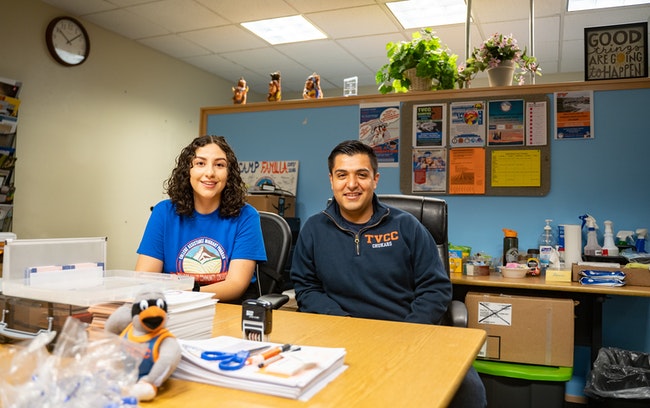
College Assistant Migrant Program (CAMP) staff Valeria Guaddarrama, adviser and retention specialist (left) and Hector Aguirre, director of the High School Equivalency Program, in the CAMP room at Treasure Valley Community College on Friday, June 11, 2021. (Liliana Frankel/The Enterprise)
ONTARIO – When Omar Robles, 19, was a senior at Ontario High School, he wanted to go to Portland State University after graduation.
He was ambitious, taking courses for college credits while still in high school, and ready to move on his dream to study accounting and then find a job or open his own business.
But Portland State was “really expensive” – and the high school’s college and career outreach coordinator, Teresa Figueroa, had different advice for him: apply for the CAMP program at Treasure Valley Community College first.
Robles, whose father worked in the farm fields for a period and whose mother worked in the onion sheds, was in his high school’s Migrant Education Program. That made him eligible for CAMP, which stands for College Assistance Migrant Program.
“It was actually worth it,” Robles said. “It helped me out a lot.”
But the local program intended to help first-generation college students from migrant and seasonal farmworking families is now itself challenged.
The federal agency funding the program notified TVCC in May that it would not get another round of financial support. That left TVCC scrambling to use some saved funds to continue providing mentorship, stipends, and academic help. It also has applied for $148,000 to carry the program through the next school year for CAMP students already committed.
In the 2019-2020 school year, the program served 40 students and 35 returned to TVCC or completed their degree.
TVCC officials are still adjusting to the funding loss.
“We were obviously disappointed,” said Abby Lee, associate vice president of TVCC. “Looking at the universities and colleges who were awarded a CAMP renewal, it’s easy to see how competitive the process was in this grant cycle. No small, rural community colleges made the final list. But we remain encouraged about what we were able to accomplish the last three years of the grant and expect to be competitive in the next round.”
Indeed, TVCC CAMP received generally good marks from its three reviewers at the Office of Migrant Education.
“The applicant presents clearly specified and measurable goals, objectives and outcomes to be achieved by the proposed project,” one reviewer wrote. “For each goal, the applicant well describes focused activities; specifies measurable outcomes; and identifies staff responsible.”
All reviewers noted the high level of need for CAMP at TVCC.
According to grant materials, 1,692 migrant students attend school in TVCC’s target area, and they face unique challenges.
“The percentage of high school migrant students who pass the reading/language arts proficiency test is only 57%,and those who pass the math proficiency test is only 16.4% compared to non-migrant students with 63.5% writing proficiency and 23.2% math proficiency,” another reviewer noted.
TVCC lost out on “experience” points, getting five out of a possible 15. That score, according to Lee, likely reflected the newness of the program, as well as issues that CAMP had recruiting students when it launched.
The Office of Migrant Education warned TVCC in letters in 2017, 2018 and 2019, requiring plans to improve CAMP.
“If you’re a new CAMP program like we were, we didn’t get the grant till late in the year,” said Edward Alves, TVCC vice president for academic affairs. “By the time you get recruiters, you’re behind the curve. Our first couple of years were not as stellar as they might have been.”
During the 2016-2017 school year, the first for CAMP at TVCC, funding was in hand for 35 students but only 14 participated.
The low number, however, was only one of several used to evaluate the program, and other measures painted a more positive picture. An evaluation done in 2017 found that “13 students will complete the year with 36 credits or more and in good academic standing. It is expected all 14 students will enroll for 2015 fall quarter or are expected to return to (TVCC) for their second year of college.”
Numbers of students enrolled in the program continued to grow as recruiters were hired and recruitment strategies refined. By 2019, the program was serving the 40 students as designed.
According to the 2019 corrective action plan submitted by TVCC, problems with CAMP at that point were due to early staffing problems.
“A search, re-selection, and re-hiring of qualified staff members took place” in the second year, the college reported. “This unfortunate situation resulted in a seven-month delay before being fully staffed once again.”
But Lee said that such staffing issues are typical for programs funded by grants.
“It’s temporary money, and when another job at the college opens with general fund money, they’re super qualified people and they look for permanent spots,” Lee explained.
Brenda Vega Vega, CAMP recruiter, said that her experience working in the program has been positive.
“I hold it close to me because I was in the program as a student at a different university,” she said. “Just now, working as a staff member, I can see the differences it makes in this community.”
Her colleague Valeria Guadarrama, CAMP advisor and retention specialist, agreed. Guadarrama said she was also a CAMP alumna from the University of Idaho, Vega’s alma mater.
“I relate to the students, and I like being part of their journey here on campus,” Guadarrama said. “They are (mostly) Latinx students. There’s also a cultural barrier that they face when they come to a community college or university.”
One facet of that cultural barrier, according to Guadarrama, is that many of the students’ parents didn’t go to college or even finish high school.
As a result, students sometimes “don’t have the proper guidance from family members to continue going onto higher education,” Vega Vega said.
But she said that she and Guadarrama shared life experiences with the students, creating a special sense of community.
“Working with students, I have seen that some can be timid to ask me questions, but I always talk about my personal experience as well, to help them feel comfortable asking me questions. This has helped students ask me questions,” Vega Vega said. “Many of our students talk to me in Spanish as well, or Spanglish. It’s not just straight business, it’s definitely trying to build that personal relationship with each student individually to open up and provide the proper services/resources needed.”
Vega Vega said that CAMP wasn’t just about helping students, but about reaching whole families.
“I’ve worked with moms for example, who are like, ‘I never had knowledge of this, or knew who I could go to,’” Vega Vega said. “If I can involve the family (parents) it makes a huge difference on how the student will succeed. This will help the family (parents) understand what the CAMP programmatic goals are and parents are able to push there student as well. This brings in more support for the student.”
Alongside CAMP, TVCC also offers HEP – the High School Equivalency Program – which serves migrant and seasonal farmworkers who need to obtain their GED. Since losing the grant, HEP Director Hector Aguirre has taken over as director of CAMP. He said that he anticipated working with CAMP students without the federal support.
“I see it as a transition,” he said. “We have some limitations, obviously, but we are working really hard.”
“We think it does give us an opportunity to reimagine and reconfigure what’s going work well for our students,” said Lee.
News tip? Contact Liliana Frankel at [email protected] or 267-981-5577.
SAFEGUARD YOUR LOCAL NEWS
Take one action today to help the Enterprise grow and do more for the community through accurate, fair reporting.
SUBSCRIBE: A monthly digital subscription is $5 a month.
GIFT: Give someone you know a subscription.
ONE-TIME PAYMENT: Contribute, knowing your support goes towards more local journalism you can trust.




